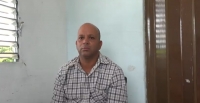José Antonio López Piña
* 1972
-
“Young people do not resemble their parents; they resemble their times, and our parents have an ideology somewhat based in the past and on the false triumphalism of socialism. And this ceases to be a contradiction in the family environment because I respect how some members of my family think, but my family does not respect how I think. Some are not compatible with the ideas that I defend out of fear, because of what has happened to me, or because they are in a workplace where they can profit from certain things for their needs. The mother is a mother at all times, but she does not agree with one because she already knows and has faced what one has suffered, and then, in a certain way, she is a bit skeptical to share your principles and is not willing to take the risk that you come running daily when you decide to face a regime. And this is reflected in my family, as I am sure it is reflected in any other family of any opponent.”
-
“As people are unaware of their rights and are devoid of all their rights, they use this mechanism to silence people because there is no better way than to misinform people and maintain a secret with the actions that you are going to do to a person. And when you start to claim your rights and the rights of other inmates in prison, many people won't support you, because they fear the sanction time might be extended. They can take away the supposed benefits they give in a prison, like a ward, like beans, like a stimulus visit, or your parole. And many prisoners talked to me and told me: compadre, I don't support you, I don't get involved in your life, nor am I in favor. But I can't get into that problem, because I want to get out of here in freedom, and you know how these people are.”
-
“The same social demotivation, the same time that I live in prison, makes me awaken other interests. I decide not to fall prisoner for trying to live comfortably, and I begin to address political orientation on how to change my life and how to face a government that has destabilized me emotionally and has deteriorated my life for trying to survive.”
-
“What can happen to me is that I'll go to prison for the non-payment of a fine because it is a mechanism that they use to unjustly take you to prison. Because the participation of the community in the work that the individuals have been doing in Cuba to denounce all these atrocities that the government has been committing on the population, is growing. And since people are tired of being lied to, because the official press all it does, is omitting the true need that the people of Cuba are experiencing. And the independent press is gaining more space every day within the population and the people see it as a mechanism to unmask the lie that the government has been carrying out with the people of Cuba.”
-
Full recordings
-
Cuba, 24.08.2020
(audio)
duration: 02:08:37
Full recordings are available only for logged users.
“A government that does not give rights cannot demand rights.”
José Antonio López Piña was born in 1972 in the province of Santiago de Cuba. His childhood was happy; his father, a military officer, had certain privileges, which allowed them to travel and spend pleasant stays in hotels paid for by the revolutionary army. His father also introduced him to the Cuban Armed Forces, where he graduated and began work as a second lieutenant of logistics. Due to the tough situation within Cuban society and his wishes for a decent life, he was imprisoned for embezzlement several times and was expelled from the Armed Forces. In prison, he devoted himself to the rights of prisoners and human rights in general. When he got out of prison, he joined an opposition group and human rights activists in Cuba. As a result of his political activism, he was tortured several times, not only physically but psychically. He is currently the regional coordinator of the Eastern Democratic Alliance [Alianza Democrática Oriental] in the Santiago de Cuba province and a reporter for the independent media, Palenque Visión, where he reports on the reality that the Cuban people live today.
